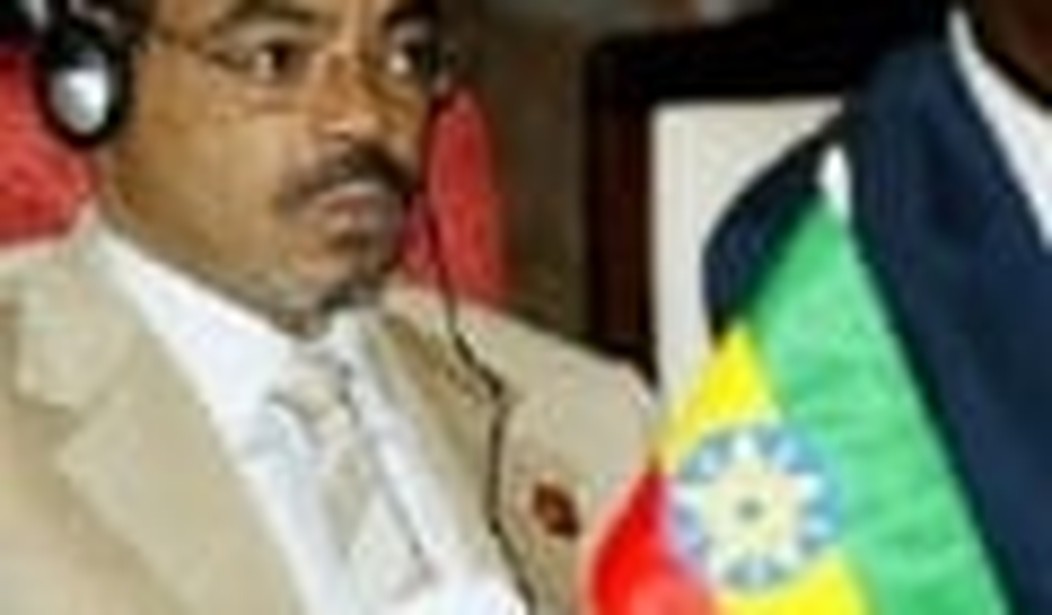Not content with passing a resolution condemning the Turkish genocide of Armenians nearly a hundred years after it happened, House Democrats are now dead-set on trying to punish Ethiopia, one of our most valuable allies in the War on Terror.
The punishment is in the guise ofH.R. 2003, the Ethiopia Democracy and Accountability Act of 2007. Sponsored by Rep. Don Payne (D-NJ), the bill was passed by the House on October 2nd by voice vote. It currently has no Senate sponsor, but there are fears that the Democratic leadership will wrap H.R. 2003 up in the massive legislative end-of-year omnibus bill making passage virtually certain and debate over the bill unlikely.
The bill’s key language:
Prohibits until the President makes specified congressional certifications: (1) security assistance to Ethiopia, with exceptions for peacekeeping, military education and training for civilian personnel, or counter-terrorism assistance; and (2) U.S. entry of any Ethiopian official involved in giving orders to use lethal force against peaceful demonstrators or accused of gross human rights violations, and government security personnel involved in specified shootings of demonstrators or prisoners
H.R. 2003 is ostensibly intended to spur further democratic progress in Ethiopia. In reality, the bill ignores the impressive (and in the Horn of Africa region, unparalleled) gains in both multi-party politics and human rights achieved in recent years and imposes a certification process that will severely cripple support for essential anti-terror efforts in this critical region. Not only would it stifle much-needed humanitarian and development funds to one of our closest and most reliable allies, but the legislation would prohibit the US from providing counter-terror and military support to Ethiopia until the stringent certification regime is met.
In a phone conversation I had with Ethiopian ambassador to the US Samuel Assefa on Monday, he expressed amazement that such a draconian measure would be considered in light of the cooperative relationship between his country and the US:
This bill is terribly misleading, and the timing of it couldn’t be worse. It can only be attributed to the changing political landscape in Washington D.C. Our country is facing serious internal and external terror threats, and we are working with our regional partners and the United States to see the situation in Somalia stabilized to prevent the return of the al-Qaeda-backed Islamic Courts Union. Neighboring Eritrea has been accused of supporting terrorist organizations, and we have the ongoing Darfur crisis to our north in Sudan. What possible interests for the United States could be satisfied by imposing these restrictions and treating Ethiopia as a rogue state, rather than a friend and ally?
Ambassador Assefa cited the example of the 2005 multi-party elections, where the opposition won 174 seats, as opposed to just 12 in 2000. More than 90 percent of the voting population participated, which prompted the US State Department to declare that the elections were “a milestone in creating a new, more competitive multiparty political system in one of Africa’s largest and most important countries.” Moreover, recently pardons were issued to restore the civil rights to opposition leaders who were involved in post-election violence in 2005. And this despite the fact that the country continues to face terrorist activity from both the Ogaden National Liberation Front (ONLF) and the Omoro Liberation Front (OLF) separatist movements.
Some on Capitol Hill have expressed serious concerns about the potential impact of H.R. 2003. One vocal critic of the bill has been Senator Jim Inhofe (R-OK), who spoke forcefully against the measure in a statement after it passed the House:
The language contained in H.R. 2003 enflames tensions already present in the Horn of Africa, threatening regional stability and long term U.S. national security. The growing instability in Somalia and the Ogaden region, combined with the unresolved border dispute between Ethiopia and Eritrea in the north, has created major challenges for Ethiopia. While I agree that the violence and intimidation that took place in the country after the 2005 election was an unnecessary use of excessive force, the Government of Ethiopia has taken significant steps to regain a democratic process that is fair and respectful of human rights.
Africa expert J. Peter Pham has also noted the singular role that Ethiopia has played in helping the US confront terror and establishing stability in the region:
Ethiopia has participated in the State Department-funded capacity-building East Africa Counterterrorism Initiative (EACTI). The Terrorist Interdiction Program (TIP), which is designed to identify terrorists and hinder their movement across borders, is operative in Ethiopian airports and other international transit points. Last year, when no one else was willing to deal with the menace of a rising Islamist movement in Somalia- which included Al-Qaeda members specially designated by the U.S. government as well as by the United Nations Security Council-Ethiopian troops preemptively dispersed the militants. All this is more than can be said for any other country in the subregion.
Pham’s comments make clear that Ethiopia is actively involved in two of the most important foreign policy challenges on the African continent – the genocide in Darfur by the Sudanese Islamist government and the continued fight to prevent Somalia from turning into a Taliban-like refuge for terrorists.
The importance of Somalia in the War on Terror was underscored last year when Osama bin Laden issued a message in support of the Islamist takeover there:
You have no other means for salvation unless you commit to Islam, put your hands in the hands of the Islamic Courts to build an Islamic state in Somalia.
Despite bin Laden’s warning against outside intervention in Somalia, Ethiopia moved to restore the UN-backed TFG government and ousted the al-Qaeda-backed Islamic Courts Union. Ethiopia has also pledged 5,000 troops to a UN peacekeeping force in Darfur.
With Ethiopia shouldering virtually all of the burden of supporting US policies in that part of the world, the present move by congressional Democrats is simply mystifying. Not only is Ethiopia strategically placed to influence Africa, but the Horn of Africa region can also be considered the gateway to the Middle East. Any damage to our relationship with Ethiopia is certain to impede our own objectives in Africa and the Middle East.
The certification regime proposed by H.R. 2003 is also unique in that their standards could never be met by many of our other international partners in the War on Terror. Egypt, Saudi Arabia, Pakistan, Uzbekistan, and many others are not even remotely as far advanced in legitimate democratic processes and reforms as Ethiopia, and many of those same countries have been identified by our own State Department as the worst human rights abusers in the world.
So why would Congress now contemplate imposing a certification regime on Ethiopia, when such a proposal has historically only been directed at rogue states and state sponsors of terror rather than committed allies, and when its standards could not be met by many of our other partners around the globe?
The very same legislators who decry the interventionist and paternalistic foreign policy they deem responsible for the poor standing of America in the world are the ones backing this measure. This legislation would undoubtedly damage our relationship with Ethiopia when the country’s well-earned friendship and sustained cooperation is most desperately needed to protect our interests in Africa and the Middle East. Worse, it would inevitably send a message to our other allies that our friendship is feckless and always subject to the political winds of change in Washington.
Patrick Poole is a counter-terror consultant to law enforcement and the Executive Director of Central Ohioans Against Terrorism.









Join the conversation as a VIP Member